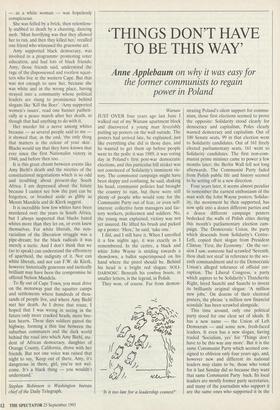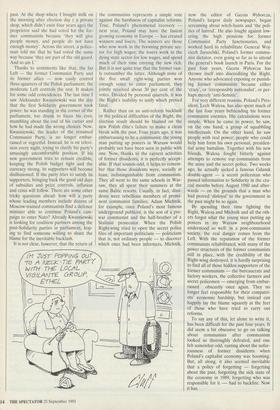'THINGS DON'T HAVE TO BE THIS WAY'
Anne Applebaum on why it was easy for
the former communists to regain power in Poland
Warsaw JUST OVER four years ago last June I walked out of my Warsaw apartment block and discovered a young man feverishly putting up posters on the wall outside. The posters had arrived late, he explained, just like everything else did in those days, and he wanted to get them up before people went to the polls: it was 1989, it was voting day in Poland's first post-war democratic elections, and this particular bill sticker was not convinced of Solidarity's imminent vic- tory. The communist campaign might have been sloppy and confusing, he said, shaking his head, communist policies had brought the country to ruin, but there were still plenty of people who would vote for the Communist Party out of fear, or even self- interest: collective farm managers and fac- tory workers, policemen and soldiers. No, the young man explained, victory was not yet assured. He lifted his brush and picked up a poster. 'Here,' he said, 'take one.'
I did, and I still have it. When I unrolled it a few nights ago, it was exactly as I remembered. In the centre, a black and white John Wayne is striding towards a showdown, a ballot superimposed on his hand where the pistol should be. Behind his head is a bright red slogan: SOLI- DARNOSC. Beneath his cowboy boots, in smaller letters, is the legend, in Polish.
They won, of course. Far from demon- 'Is it too late for a leadership contest?' strating Poland's silent support for commu- nism, those first elections seemed to prove the opposite: Solidarity stood clearly for democracy and capitalism, Poles clearly wanted democracy and capitalism. Out of 100 Senate seats, 99 in that election went to Solidarity candidates. Out of 161 freely elected parliamentary seats, 161 went to Solidarity candidates. The first non-com- munist prime minister came to power a few months later; the Berlin Wall fell not long afterwards. The Communist Party faded from Polish public life and history seemed to be setting off in a new direction.
Four years later, it seems almost, peculiar to remember the earnest enthusiasm of the man with the John Wayne posters. Solidar- ity, the movement he then supported, has now split into a dozen different parties and a dozen different campaign posters bedecked the walls of Polish cities during this month's parliamentary election cam- paign. The Democratic Union, the party which descends from Solidarity's Centre- Left, copied their slogan from President Clinton: 'First, the Economy.' On the ver- sion I saw, someone had scrawled 'Seventh, thou shalt not steal' in reference to the sev- enth commandment and to the Democratic Union's alleged tolerance of official cor- ruption. The Liberal Congress, a party which aspires to be Solidarity's Thatcherite Right, hired Saatchi and Saatchi to invent its brilliantly original slogan: 'A million new jobs.' On dozens of their electoral posters, the phrase 'a million new financial scandals' has been scrawled alongside.
This time around, only one political party stood for one clear set of ideals. It has a new name — the Union of Left Democrats — and some new, fresh-faced leaders. It even has a new slogan, having traded 'Socialism, yes' for 'Things don't have to be this way any more'. But it is the same Communist Party which seemed con- signed to oblivion only four years ago, and, however new and different its national leaders may claim to be, those who voted for it last Sunday did so because they want that same Communist Party back. Its local leaders are mostly former party secretaries, and many of the journalists who support it are the same ones who supported it in the
past. At the shop where I bought milk on the morning after election day ( a private shop, which didn't exist four years ago) the proprietor said she had voted for the for- mer communists because `they will give people money, and people do not have enough money'. Across the street, a police- man told me that he had voted the same way because `they are part of the old guard. And so am I.'
Thanks to sentiments like that, the far Left — the former Communist Party and its former allies — now easily control three-quarters of the Polish parliament; the moderate Left controls the rest. It makes for some odd coincidences. The last time I saw Aleksander Kwasniewski was the day that the first Solidarity government took power: he was standing in the corner of the parliament, too drunk to focus his eyes, mumbling about the end of his career and how he had made the wrong choices. Now, Kwasniewski, the leader of the renamed Communist Party, is no longer embar- rassed or regretful. Instead, he is on televi- sion every night, trying to clarify his party's amusingly uncomfortable position. If his new government tries to remain credible, keeping the Polish budget tight and the currency strong, its supporters will become disillusioned. If the party tries to satisfy its supporters, bringing back the good old days of subsidies and price controls, inflation and crisis will follow. There are some other tricky questions ahead: how will a party whose leading members include dozens of Moscow-trained communists find a defence minister able to continue Poland's cam- paign to enter Nato? Already Kwasniewski is looking for coalition partners among the post-Solidarity parties in parliament, hop- ing to find someone willing to share the blame for the inevitable backlash.
It is not clear, however, that the return of the communists represents a simple vote against the harshness of capitalist reforms. True, Poland's phenomenal recovery — next year, Poland may have the fastest growing economy in Europe — has created winners and losers. The winners are those who now work in the booming private sec- tor for high wages; the losers work in the dying state sector for low wages, and spend much of their time envying the new rich. But it is not quite true that the former vast- ly outnumber the latter. Although none of the five small right-wing parties won enough votes to enter parliament, they jointly received about 30 per cent of the votes. Divided by personal quarrels, it was the Right's inability to unify which proved fatal.
Rather than on an anti-reform backlash or the political difficulties of the Right, the election result should be blamed on the new Polish elite's failure to make a clean break with the past. Four years ago, it was embarrassing to be a communist: the young man putting up posters in Warsaw would probably not have been seen in public with one. Now, thanks to the earnest activities of former dissidents, it is perfectly accept- able. If that sounds odd, it helps to remem- ber that those dissidents were, socially at least, indistinguishable from communists. They all went to the same schools in War- saw, they all spent their summers at the same Baltic resorts. Usually, in fact, dissi- dents were rebellious members of promi- nent communist families; Adam Michnik, for example, once Poland's most famous underground publicist, is the son of a pre- war communist and the half-brother of a Stalinist prosecutor. When the Polish Right-wing tried to open the secret police files of important politicians — politicians that is, not ordinary people — to discover which ones had been informers, Michnik,
now the editor of Gazeta Wyborcza, Poland's largest daily newspaper, began screaming about witch-hunts and 'the poli- tics of hatred'. He also fought against low- ering the high pensions for former Communist Party functionaries, and worked hard to rehabilitate General Woj- ciech Jaruzelski, Poland's former commu- nist dictator, even going so far as to attend the general's book launch in Paris. For the past four years, Gazeta Wyborcza has thrown itself into discrediting the Right. Anyone who advocated exposing or punish- ing former communists became either 'crazy', or 'irresponsibly nationalist', or per- haps merely 'anti-Semitic'.
For very different reasons, Poland's Pres- ident, Lech Walesa, has also spent much of the last four years befriending his former communist enemies. His calculations were simple. When he came to power, he saw, on the one hand, a group of squabbling intellectuals. On the other hand, he saw people with real power; people who could help him form his own personal, presiden- tial army battalion. Together with his new friends, Walesa fought bitterly against attempts to remove top communists from the army and the secret police. Two weeks ago, he actually sacked a famous Gdansk double-agent — a secret policeman who passed information to Solidarity in the cru- cial months before August 1980 and after- wards — on the grounds that a man who had proved 'disloyal' to the government in the past might be so again.
By spending their time fighting the Right, Walesa and Michnik and all the oth- ers forgot what the young man putting up posters in my Warsaw neighbourhood understood so well: in a post-communist society, the real danger comes from the Left. With the reputation of the former communists rehabilitated, with many of the power structures of the former communists still in place, with the credibility of the Right-wing destroyed, it is hardly surprising to find all of those hidden supporters of the former communists — the bureaucrats and factory workers, the collective farmers and secret policemen — emerging from embar- rassed obscurity once again. They no longer feel responsible for their compatri- ots' economic hardship, but instead can happily lay the blame squarely at the feet of those who have tried to carry out reforms.
To say any of this, let alone to write it, has been difficult for the past four years. It did seem a bit obsessive to go on talking about communists after communism looked so thoroughly defeated, and one felt somewhat odd, ranting about the nefar- iousness of former dissidents when Poland's capitalist economy was booming. But, all along, it also seemed inevitable that a policy of forgetting — forgetting about the past, forgetting the sick state of the economy in 1989, forgetting who was responsible for it -- had to backfire. Now it has.



























































 Previous page
Previous page